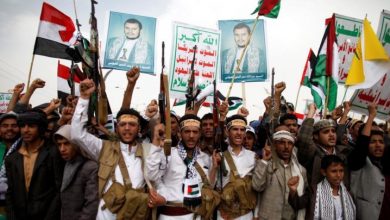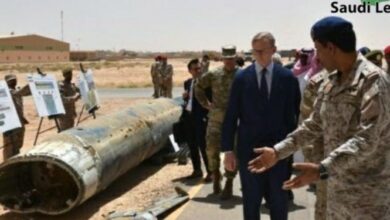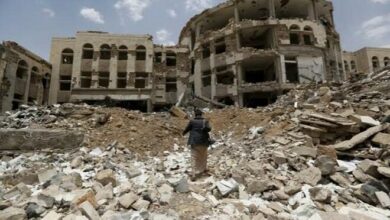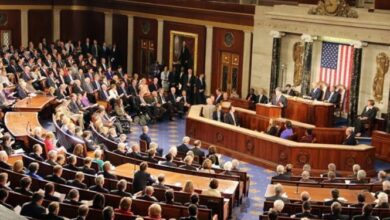Clear contradiction in the Saudi coalition’s image in Yemen
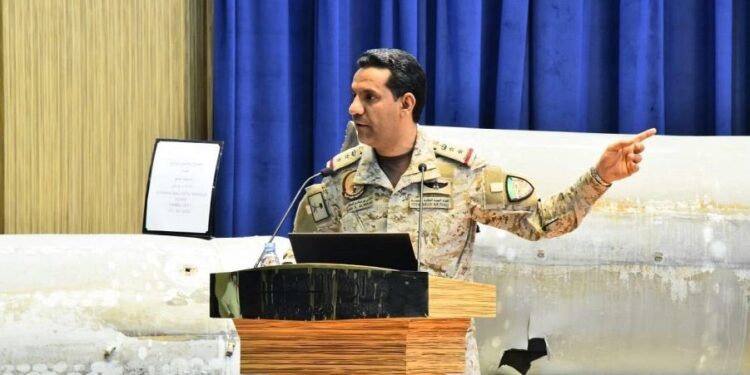
A realty of contradiction emerges from the outcome of the Saudi military alliance’s image of the war on Yemen after more than five years of the beginning of the war, which resulted in nothing but destruction for Yemen while not achieving any of its goals in fighting the Houthi group.
When the Saudi regime declared its war on Yemen, it was keen to promote a showy image of the latest Western military industries production, amid promises to end the war within only weeks.
After five years of the war, the coalition’s military spokesman appeared with an image on the background of Houthi missiles, complaining to the UN Security Council about bombing Riyadh and large areas in the Kingdom.
The Saudi-Emirati coalition has confirmed that the Houthi group in Yemen is still targeting Saudi Arabia with quality Iranian weapons, while the Houthis have vowed to respond harshly to coalition attacks targeting governorates they control.
Spokesman for the Saudi-Emirati coalition, Turki al-Maliki, said that the coalition destroyed eight drones and four ballistic missiles, in addition to ballistic missile workshops and drones to launch drones, pointing to Iran’s support for the Houthis with quality weapons that threaten regional and international security as he put it.
For its part, the Houthi group considered Maliki’s statements as lies, and a tacit recognition of their manufacturing capabilities and the success of their strikes directed at Saudi Arabia, promising a further harsh response.
“Our forces will continue to target the Saudi military and sovereign institutions, which are the spearhead of its aggression on Yemen and the Yemeni people, whose civilian objects were destroyed for five years,” said Houthi military spokesman Yahya Sarai.
The Houthi group announced that two people were killed and four wounded, including children, in air strikes launched by the coalition in Saada governorate yesterday evening, adding that the coalition carried out 57 new raids on separate areas of Yemen, including 21 raids on Sanaa.
The coalition launched raids on Daylami Air Force Base, the 22nd May Military Maintenance Complex, a warehouse of household appliances in the Sa`wan region, and sites in the al-Hatrash district, east of the capital, Sana’a, as well as the mountains of Eiban and Nahedin, southwest of the capital.
Unprecedented investigation
In a related context, Amnesty International’s France office, in a year-long investigation into the sale of French weapons to Saudi Arabia and military cooperation with them, said that the Belgian Commercie Coquirel Center located in France is preparing to receive Saudi soldiers to train them to use weapons in Yemen.
The investigation, conducted by journalist Audrey Loubeland was described as unprecedented, told the news magazine “La Kronik” published by Amnesty International that titled “France is the Land of Welcome”, said that with Paris maintaining this trade with Riyadh, it has become involved in war crimes in Yemen, in stark contrast to its international obligations.
The editor of the investigation expressed regret that the sale of French weapons was not subject to the supervision of Parliament, and that deputies were under pressure when trying to intervene or obtain information related to what she described as the death trade.
The highest rate of child recruitment
On the other hand, an international report said that Yemen is one of the countries that witnesses high rate of child recruitment that was verified in 2019. The country came the third after both Somalia and the Democratic Republic of the Congo.
The report presented at the 44th session of the United Nations Human Rights Council in Geneva indicated that the number of children killed in Yemen has increased due to air strikes, ground fighting, and land mines. The report presented by the Special Representative of the Secretary-General for Children and Armed Conflict added that 2019 witnessed an increase in the proportion of children who have been denied humanitarian assistance in conflict areas.
The report indicated that the Special Representative traveled to Riyadh in March last year to sign a memorandum of understanding on improving the protection of children affected by the conflict in Yemen, and to develop a plan to prevent the killing and maiming of children in coalition operations.
In regional efforts, Omani Foreign Minister Yusuf bin Alawi met in Muscat with the United Nations Secretary-General’s Special Envoy to Yemen Martin Griffiths.
The Omani Foreign Ministry said in a tweet on Twitter that the international envoy thanked the Sultanate for its efforts to deliver aid and achieve peace in Yemen. Bin Alawi also affirmed the continued support of the United Nations efforts to reach a political solution that would bring the Yemeni people security and stability.

